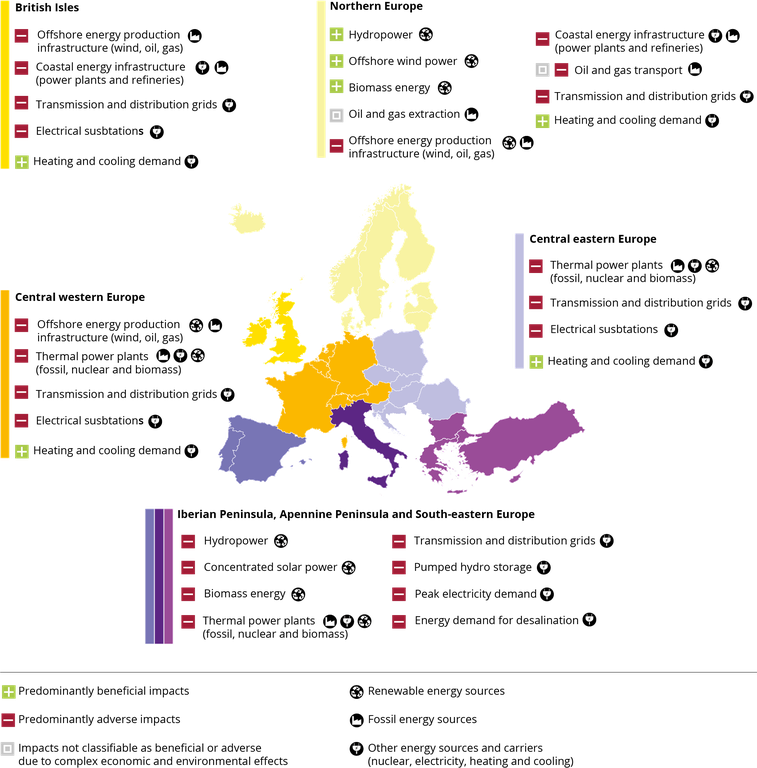The EEA assessment ‘Adaptation challenges and opportunities for the European energy system’ analyses the needs for climate change adaptation and climate resilience in Europe’s energy system now and in the future. This assessment supports the clean energy transition, which involves a massive expansion of renewable energy sources, many of which are sensitive to climate factors.
The new assessment warns that climate change and extreme weather events increasingly affect all parts of the European energy system. The most important changes include increases in mean and extreme air and water temperatures, and changes in water availability, extreme climate‑related events, and coastal and marine hazards. These changes will affect the availability of primary energy sources — especially renewable energy sources — as well as the transformation, transmission, distribution and storage of energy, and energy demand.
Some of the climate change impacts on the energy system can be economically beneficial, such as reduced energy demand for heating, but many impacts are negative for both the energy sector and the society as a whole. Such impacts include reduced cooling water availability for thermal power plants and reduced water availability for hydropower production, and increasing risks for energy infrastructure from extreme weather events and sea level rise, the assessment states.
According to the EEA assessment, climate change impacts and related adaptation needs vary significantly across European regions. In general, northern Europe will experience both beneficial and adverse impacts on its energy system, whereas southern European regions face overwhelmingly adverse impacts.

The evolving policy framework under the Energy Union provides unique opportunities for mainstreaming climate change adaptation in national and European energy planning. The assessment recommends considering the impacts of climate change in the development of national climate and energy plans and long‑term strategies under the EU Energy Union. Market actors in the energy sector should also consider strengthening climate resilience as an integral part of their business.
Key findings:
- Water availability is generally projected to increase in northern Europe and decrease in southern Europe, but with marked seasonal differences. These changes can affect cooling water availability for thermal power plants, hydropower and bioenergy potential, fuel transport on rivers, and energy demand for water provision.
- Replacing coal‑fired power plants by solar and wind power radically reduces greenhouse gas emissions and water consumption, thus contributing to mitigation as well as adaptation in water‑scarce regions.
- Biofuels and carbon capture and storage require significant amounts of water or arable land, which may limit their expansion, in particular in water-scarce regions.
- Warming temperatures decrease energy demand for heating, but increase energy demand for cooling. They can also affect electricity generation and transmission.
- Climate change can affect the potential for wind and solar power, but available projections are associated with significant uncertainty.
- Several studies indicate that, without appropriate adaptation measures, direct damages to the European energy system from extreme weather events could amount to billions of euros per year by the end of the century, with much larger indirect costs.
Background
The key driver for changes in the global and European energy system is the need for a clean energy transition that drastically reduces greenhouse gas emissions. The EU is building the Energy Union, which aims at making energy more secure, affordable and sustainable. The EU has adopted several quantitative targets related to the energy system in its 2030 climate and energy framework. The European Commission has proposed a strategy for a climate‑neutral economy by 2050, including several long‑term decarbonisation scenarios up to 2050. The EU has also evaluated its adaptation strategy with a view to revising it.

Document Actions
Share with others